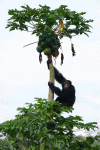Chimpanzees share forbidden fruit
- PMID: 17849015
- PMCID: PMC1964537
- DOI: 10.1371/journal.pone.0000886
Chimpanzees share forbidden fruit
Abstract
The sharing of wild plant foods is infrequent in chimpanzees, but in chimpanzee communities that engage in hunting, meat is frequently used as a 'social tool' for nurturing alliances and social bonds. Here we report the only recorded example of regular sharing of plant foods by unrelated, non-provisioned wild chimpanzees, and the contexts in which these sharing behaviours occur. From direct observations, adult chimpanzees at Bossou (Republic of Guinea, West Africa) very rarely transferred wild plant foods. In contrast, they shared cultivated plant foods much more frequently (58 out of 59 food sharing events). Sharing primarily consists of adult males allowing reproductively cycling females to take food that they possess. We propose that hypotheses focussing on 'food-for-sex and -grooming' and 'showing-off' strategies plausibly account for observed sharing behaviours. A changing human-dominated landscape presents chimpanzees with fresh challenges, and our observations suggest that crop-raiding provides adult male chimpanzees at Bossou with highly desirable food commodities that may be traded for other currencies.
Conflict of interest statement
Figures


References
-
- Stevens JR, Gilby IC. A conceptual framework for nonkin food sharing: timing and currency of benefits. Anim Behav. 2004;67:603–614.
-
- Feistner ATC, McGrew WC. Food-sharing in primates: a critical review. In: Seth PK, Seth S, editors. Perspectives in Primate Biology, Volume 3. New Delhi: Today and Tomorrow's Printers and Publishers; 1989. pp. 21–36.
-
- Gilby IC. Meat sharing among the Gombe chimpanzees: harassment and reciprocal exchange. Anim Behav. 2006;71:953–963.
-
- de Waal FBM. Food sharing and reciprocal obligations in chimpanzees. J Hum Evol. 1989;18:433–459.
-
- Mitani JC, Watts DP. Why do chimpanzees hunt and share meat? Anim Behav. 2001;61:915–924.
Publication types
MeSH terms
LinkOut - more resources
Full Text Sources

